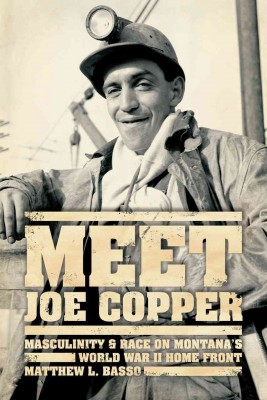| Meet Joe Copper: Masculinity and Race on Montana's World War II Home Front Contributor(s): Basso, Matthew L. (Author) |
|
 |
ISBN: 022604419X ISBN-13: 9780226044194 Publisher: University of Chicago Press OUR PRICE: $33.66 Product Type: Paperback Published: July 2013 |
| Additional Information |
| BISAC Categories: - Social Science | Gender Studies - History | United States - 20th Century |
| Dewey: 331.762 |
| LCCN: 2012043674 |
| Physical Information: 0.9" H x 6" W x 8.9" (1.15 lbs) 360 pages |
| Themes: - Chronological Period - 20th Century |
| Descriptions, Reviews, Etc. |
| Publisher Description: "I realize that I am a soldier of production whose duties are as important in this war as those of the man behind the gun." So began the pledge that many home front men took at the outset of World War II when they went to work in the factories, fields, and mines while their compatriots fought in the battlefields of Europe and on the bloody beaches of the Pacific. The male experience of working and living in wartime America is rarely examined, but the story of men like these provides a crucial counter-narrative to the national story of Rosie the Riveter and GI Joe that dominates scholarly and popular discussions of World War II. In Meet Joe Copper, Matthew L. Basso describes the formation of a powerful, white, working-class masculine ideology in the decades prior to the war, and shows how it thrived--on the job, in the community, and through union politics. Basso recalls for us the practices and beliefs of the first- and second-generation immigrant copper workers of Montana while advancing the historical conversation on gender, class, and the formation of a white ethnic racial identity. Meet Joe Copper provides a context for our ideas of postwar masculinity and whiteness and finally returns the men of the home front to our reckoning of the Greatest Generation and the New Deal era. |
Contributor Bio(s): Basso, Matthew L.: - Matthew L. Basso is assistant professor of history and gender studies at the University of Utah. He is editor of Men at Work: Rediscovering Depression-Era Stories from the Federal Writers' Project and coeditor of Across the Great Divide: Cultures of Manhood in the American West. |